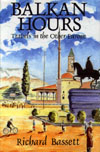
Like Marcus Tanner, Richard Bassett is also a correspondent, he for the British newspaper, The Times. But Bassett is a traveler first, a wanderer-philosopher with more in kin to Patrick Leigh Fermor than Tanner. Whereas Tanner’s book was a dry mix leavened with a few interesting tidbits, Bassett’s Balkan Hours: Travels in the Other Europe is a wonderfully tasty morsel that’s nourishing as well. When Bassett interjects history into his narrative, it’s in a story format, with the historical personages real and breathing, their motivations and foibles for all to see. Bassett’s book is worth reading for his version of the assassination of Franz Ferdinand alone, almost a sitcom, yet also tragic, but nothing written is untrue with regard to the facts known. Bassett’s travels were also written in the late 1980s, and that’s when his last major visit to the area took place, although he is able to add some impressions from previous trips to Yugoslavia. Instead of the misery of Bosnia-Hercegovina that we read about daily, Bassett’s journey coincided shortly after the massacre of Albanians at Kossovo field, and the Yugoslav (yet, mainly Serbian) troops were still mobilized in the area. The Albanian massacre is like the coming of John the Baptist before the Bosnian Jesus, and Bassett is enough of a prophet to be able to interpret the blood in the field. From the start of his journey in Trieste, Bassett sets the tone as light and jovial, with an undercurrent of seriousness. For him, the trip is an interesting jaunt into a foreign country of music halls and museums, but he realizes that for the people he meets and converses with, this is their life. Early on, in Croatia, he passes on the comments of one Croat regarding a museum collection.
“‘[I]t reminds us that we are linked with Europe,'” says the man. “‘We are closer to this art than the South.'” We are only just in Yugoslavia, and yet we already see that the country isn’t the gestalt that it seems to be in name. A few pages over, Bassett talks about a Croatian national hero, one soldier by the name of Jellacic, whose statue lies hidden in Zagred. “‘The politicians need it,'” says a Croat. “‘One day it will come back, though who knows if the sword will still be pointing towards Hungary [as it had been in history],’ he added, a twinkle in his eye.” Foreboding, and underscored by Bassett’s footnote, “…the statue is due to be re-erected by the end of 1990, the result of old passions again stirring in the Balkan world.”
Travelers are often acquainted with the people who have been there before them, the writer-journeyers of previous centuries. Fermor quoted George Borrow, an expert on Gypsies, and Bassett took with him Rebecca West’s “formidable 700-page Black Lamb and Grey Falcon.” Indeed, West proved to be an interesting discussion piece between Bassett and his guide at the time, “Ksenja Trescec von Branski, the daughter of an old Croatian family ennobled by the Habsburgs.” Her comment, after Bassett has read her a passage on Empress Elizabeth who attempted to reside in Dubrovnik, is “‘Why, this is outrageous! You could sue this woman for what she has written.'” Bassett’s own feeling regarding West’s work is “an emotional tour de force which for all its wealth of information is predictably violently anti-German,” which he goes on to say includes “the nearest thing to the Germans which had ever descended on the Dalmatian coast before 1941, the Austrians.” Literary criticism or ethnic-related bias, the discussion reminds us that all books are written under the prejudices of their authors, both West’s and Bassett’s. Although Bassett’s prescience was acute in Croatia, when he makes it to Belgrabe it becomes even more perceptive. Outside his hotel, an “audience of several tens of thousands of Serbs…gathered for a mass demonstration of sympathy with the beleaguered Kossovo Serbs.” During the meeting, a slogan rings out that should resonate with our age, “Long live Slobo.” Although “slobo” is freedom in Serbian, the yell is actually a clever allusion to Serbian leader Slobodan Milosevic. In the pages that follow, Bassett tells of the veteran Times correspondent in that area, Madam Dessa Trevisan, who “had ‘spotted’ Milosevic and seen him for the threat to potential Jugoslav democracy he is and as the man who would determine the country’s future.” It is clear that Trevisan and Bassett have little faith in Milosevic’s leadership, and Bassett gives some examples. In light of present troubles, it is interesting to see commentary on one of the integral players. Bassett finished off his trip in Rumania, shortly after the Ceausescus had been deposed. He was given a tour of the building projects of the “mad Conducator” by the young architect who had been forced to work on them. The description of these buildings and the circumstances behind their being built, as much a product of Ceausescu’s wife as the Conducator himself, would be funny if they weren’t true. Instead, one is appalled by the waste and power of the Ceausescus. When Elena Ceausescu “had attempted to understand some drawings sent to her for her approval,” the architect had spent twenty-five minutes explaining, to be then told to build a model. He later presented her with a miniature, but the model was too small for her, and she insisted upon “a 1:1 scale model that took six months to construct.” The design didn’t meet with her approval, and the boulevard had to be demolished yet again.
[Finished 21 November 1993]
